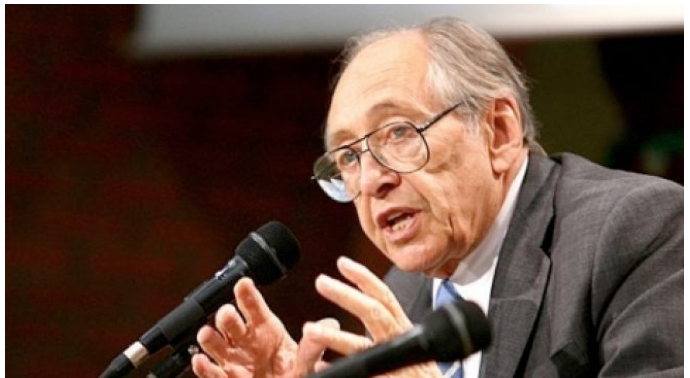CommentsGUEST WORDS--I have a lot of respect for journalist Farhad Manjoo, who currently writes a tech column for the New York Times. But a few things struck me from his recent piece on Alvin Toffler (photo above), the writer of the six-million copy bestseller “Future Shock” (1970) who died recently at the age of 87. Manjoo captured Toffler well, but drew the case for a world overwhelmed by technological advancements much too starkly:
“…in rereading [the] book, as I did last week, it seems clear that his diagnosis (of ‘future shock’) has largely panned out, with local and global crises arising daily from our collective inability to deal with ever-faster change.”
Really? We are now to lay all societal and political ills, both foreign and domestic, at the feet of tech advancements? Manjoo, who is just 38 years old, sounds co-opted by digital elder-think, the affliction of many people over 50 who project onto everyone else their clumsiness and resistance to the firehose stream of messages and notices brought to us daily through our mobile devices.
I have two millennial kids in their early and mid-twenties who seem to be adapting quite capably. They’re not much different than their peers. Their brains and social mythos may not resemble my older brain and views, but I have confidence that their grit and inventive powers remain undiminished. I put stock in those powers, as I believe we all should for the better part of the reasonably smart, reasonably stable kids stepping up to fill our shoes.
“Millennials are going to save our asses!” roared a thoughtful boomer friend a few evenings ago when a group of us got together. Between us we have collectively parented at least a score of kids, all now aged between 20 and 32 years old. His was a frustrated rebut to our lamenting over the polarized state of American politics, and I believe his pronouncement approaches a ground truth. Let’s give the rising generation of young people all due credit for absorptive capacities either absent or anemic in we aging but still quite sentient products of a slower time.
Manjoo’s column also reminded me of something I heard said by David Matthews, President and CEO of Kettering Foundation, at a conference in the early 2000s. When asked how what was then a new world of digital technology would influence politics, civics and society in general, Matthews gave a classic Matthews response in his slow Alabama drawl: “Willy. Nilly.” Which he pronounced “Willah. Nillah.” to our appreciative laughter. By that, he meant that technology’s effects would fall unevenly across people of the globe -- more like the way rainfall varies across vast and differing landscapes than like a tsunami pouring a devastating wall of water over us all.
Finally, I think it’s inaccurate to suggest that because of the demise of knowledge centers like the Carter Administration’s Office of Technology Assessment the public sector is now at a complete loss for predictive perspectives on the future. We’ve still got the U.S. Defense Department’s DARPA (Defense Advanced Research Projects Agency) program and dozens of private and public institutes and universities that contract with government on research ventures of all kinds.
We’re a country that builds hybrid institutional collaborations – public, private, nonprofit and combinations thereof – that don’t have distinction or the classic jurisdictional mandates of permanent governmental institutions. But they still manage to effectively elevate ideas and productive thinking into public discourse through other means and mechanisms. We do that because we have a history of not trusting public institutions too, too much for innovation, even as much as we rely and count on them to step in and help us with large-scale services and resources when things go haywire in giant ways.
I picture Alvin Toffler going to his grave not at all a pessimist but rather as what I like to think of as an “awesome-ist,” struck dumb at times by the sheer wonder of how resilient humanity can be. He had an appreciation few people can grasp for the astonishing disruption that new tools and discoveries can unleash.
Toffler clued us in with “Future Shock” to what he rightly foresaw as some dire consequences of rapid technological change. But he had a child, too, who, very sadly, died at about the same age Farhad Manjoo is today.
At least for the time Karen Toffler was alive, I bet her father regarded the planet and its people with a measure of abiding hope, even fervent optimism, that the flesh and the ideas he spawned would throw into the common enterprise and blaze the way ahead. Not always perfectly, by any means, but amazingly well.
(Paul Vandeventer is President and CEO of Community Partners. Prepped for CityWatch by Linda Abrams.
Sidebar
Our mission is to promote and facilitate civic engagement and neighborhood empowerment, and to hold area government and its politicians accountable.

 CityWatch Los Angeles
Politics. Perspective. Participation.
CityWatch Los Angeles
Politics. Perspective. Participation.
28
Sat, Feb














